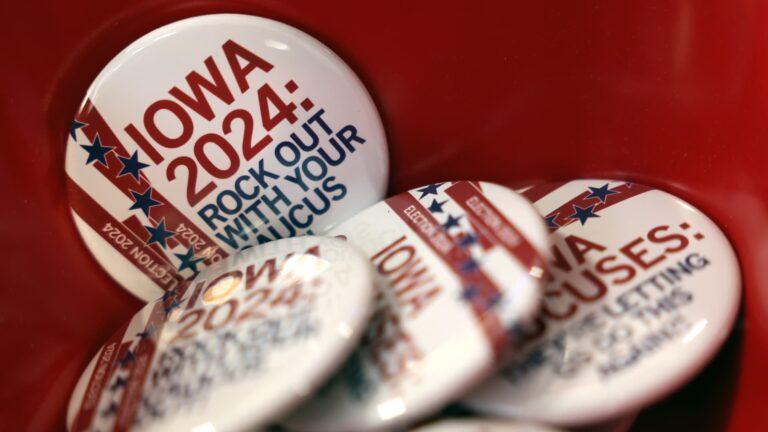Iowa voters will brave subzero temperatures on January 15 to sit in school gyms, churches and community centers to debate who they want to be the next president of the United States.
of iowa caucus It is the first voting event in the Republican presidential primary. These tend to provide the first signals as to what direction the presidential election is headed.
Iowa is a turning point for Republican candidates who have been campaigning for months to unseat incumbent President Joe Biden. For candidates, it could provide the momentum they need to close the gap in approval ratings with the Republican front-runner and former President Donald Trump. Alternatively, Trump could tighten his grip on the Republican base even more, widening his path to the nomination.
What is a caucus?
A caucus is an in-person meeting where individuals gather to coordinate on a specific issue.
In presidential elections, caucuses are where voters give and hear speeches about candidates and cast their votes. This differs from the way presidential primaries are now common, where voters are at the polls throughout the election day, casting secret ballots or mailing their ballots remotely.
For the Republican caucus, there are no remote options.Voters must appear in person at the election venue designated area This may exclude people who would like to attend but are unable to do so due to childcare, work schedules, or other reasons. They also self-select voters who are comfortable expressing their political views in public.
Caucuses were once much more prevalent in the U.S. electoral system than they are today. Along with Iowa, only three states still hold caucuses: Nevada, Wyoming, and North Dakota. Caucuses will also be held in U.S. territories such as American Samoa, Guam and the Virgin Islands.
Why are the Iowa caucuses important?
Because of the logistical challenges of caucusing, Iowa can help gauge the strength of a candidate’s voter base. People who find a way to spend a Monday night in a high school gym during a snowstorm tend to become fervent supporters of a candidate.
More specifically, the caucus results will determine the percentage of Iowa’s 40 delegates each candidate receives. But Iowa represents a small portion of the nation’s delegates, so winning state delegates is not necessarily a candidate’s primary goal.
Instead, Iowa is focused on exceeding expectations so candidates can weave a narrative that provides momentum for the rest of the primary. As the first official litmus test of a candidate’s viability, the results give voters a way to determine who has a chance on the national stage.
Historically, Iowa has determined Democratic presidential candidates more than Republicans.
How will Republicans caucus in Iowa?
Republican voters will gather in designated local precincts across the state Monday night. There, the caucus chairman and secretary are elected to run the meeting. Then, before caucus attendees cast their paper ballots, surrogates will take to the streets on behalf of the candidates.
The results of that vote will determine the percentage of the 40 Iowa convention delegates each candidate receives. Those delegates then begin the months-long process of attending county conventions before facing elections to determine delegates to the Republican National Convention.
How will Democrats caucus in Iowa?
For Democrats, the 2024 caucuses are largely a formality and won’t have much impact on the campaign. Unlike previous years, the Iowa Democratic Party will be able to mail out potential candidates, and caucus night will be largely focused on administrative business and beginning the selection of delegates.
Iowa Democrats used to caucus by listening to speeches, then standing up and physically organizing into different groups of candidates. That won’t happen this year.
Democrats intentionally reduced their focus on the Iowa caucuses after the 2020 vote-counting mistakes. Technical problems disrupted the reporting process, delaying the publication of results by several days.
Which candidate is in the lead?
As with most early polls over the past few months, Trump holds a significant lead among Republican candidates in Iowa. But Iowans sometimes shock people.
In 2020, then-Democratic candidate Pete Buttigieg won Iowa with a surprising lead, despite being relatively unknown compared to rivals such as Biden the previous year. In 2016, Republican candidate Ted Cruz won the state over Trump, who later claimed that Cruz’s victory was due to “fraud.”
Iowans take pride in having the first say in presidential elections, and often reward candidates who take their efforts seriously by spending time in the state.
Republican candidate Vivek Ramaswamy is working to achieve what he calls “double grassland,” an internal term for visiting all 99 Iowa counties twice. Florida Governor Ron DeSantis is working to complete a “Full Grasshopper,” which will include one visit to each of Florida’s 99 counties. Trump has significantly reduced the amount of time he spends in the state, frequently holding events where he speaks on his behalf, including appearances by his son Eric Trump. Former U.N. Ambassador Nikki Haley is also less focused on Iowa and more invested in New Hampshire, the nation’s second-largest primary state.
Ramaswamy may be leading the charge on retail policy, but that’s just one part of a complete Iowa strategy. After all, DeSantis receives major support in Iowa from people like: Bob Vander Platzan influential evangelical leader who supported the Republican winner in the past three caucuses.
Former Arkansas Gov. Asa Hutchinson’s approval rating in Iowa is about 1%, the minimum standard he should exceed.
That means that even though Trump was expected to win, the Iowa race is far from over.
When are the caucuses?
The caucuses for both parties will officially begin at 7:00 pm (Central Time). Voters are likely to begin trickling into caucus venues hours in advance, with doors typically opening at 5 p.m. The caucus meeting is expected to last an hour before vote counting begins. If all goes well, results should be known shortly before midnight.
How can I follow the Iowa caucuses?
CNBC will provide live coverage Monday from the hours leading up to the caucuses until the results are reported.



